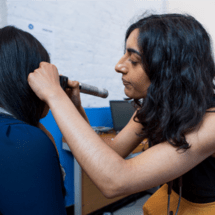
People are so worried about how they will be treated and concerned about the consequences for their immigration status that they are not using vital health services, a new report from the Equality and Human Rights Commission (EHRC) has found, prompting it to call for a greater separation of the immigration and healthcare systems.
New research published today by EHRC explores the experiences of people who are or have been in the asylum process in the UK, as well as engaging with healthcare professionals and analysing existing research.
The research found some positive practices, such as medical staff showing empathy and compassion, individuals being referred to counselling services and charities acting as a lifeline for those trying to navigate the asylum and healthcare systems. However, it also identified a number of problems with the current system, many of which particularly affected people who need regular access to healthcare services, such as pregnant women and disabled people.
People reported serious concerns that they may be arrested, detained or deported as a result of healthcare providers sharing their data with the Home Office. One individual spoke of her and her husband’s fear that their information would be shared not only with the Home Office but potentially also with authorities in their home country who had been responsible for her husband’s torture. She said:
“My husband was having blackouts, and had a problem with his heart, but we were really afraid to go to the hospitals. We didn’t know what would happen if we went there and they checked our application status. So there were times we decided to stay at home and not go.”
Scottish Refugee Council worked with EHRC and Doctors of the World to gather evidence from people affected in Scotland. Sabir Zazai, Scottish Refugee Council’s CEO said:
“Access to healthcare is absolutely non negotiable. It is unacceptable that people are prevented from seeking the help they need because they are frightened of repercussions related to their immigration status. The men, women and children affected by this are here because they are seeking protection from war, terrorism and persecution. They may have experienced torture or other forms of extreme violence and it is essential that they receive the healthcare they need and are entitled to in the UK. The EHRC’s report provides clear recommendations to government that must be acted on.”
Read the report and its recommendations here
